5 Major Reasons for Canada Student Visa Rejection
Getting accepted into a university or college in Canada is a great milestone for any international student. However, obtaining a study permit is required before you come to Canada. But it is not an easy job to do since many student visas get rejected regularly.
Still, students from other countries who want to study in Canada are rejected at a higher rate than usual because of the reputation of Canadian colleges and universities and the backlog of applications caused by the pandemic. In fact, Immigration, Refugees, and Citizenship Canada (IRCC) gave out 329,213 study permits in 2021, and 60% of all student visa applications were approved. In comparison, the approval rate for study permits dropped to 55% for the first quarter of 2022.
The rate of visa rejections has increased along with the number of visa applications. As per reports, roughly 30% of these visas are denied each year. This article explores the main reasons for Canada student visa rejection and offers advice on how to avoid them.
Best Courses in Canada for Indian Students
Top Reasons for Canada student visa rejection
1. Uncertainty funding schooling
This is one of the key reasons for Canada student visa rejection for international students planning to study in the country. If you want to study in Canada, you’ll need to prove that you have enough money saved up to cover your tuition and living costs for at least the first year of your program. Students must provide their bank statements as references. Any indication of financial instability will result in the rejection of the visa application.
The application won’t be granted if the bank statements indicate insufficient financial resources. Students might lessen their odds of being rejected by the admissions committee by including credible evidence of financial resources with their application.
2. Problems with identification and previous travel records
It is essential that you complete the application and provide all supporting materials. The students are responsible for completing the documentation process in accordance with the requirements. There needs to be valid proof and official documentation to back up the travel history. Every document connected to identity verification, including personal identification proof, passport-size photos, properly completed forms, and others, should be valid.
3. Plans to go back to home country
The authorities granting your visa will want to know if you plan to leave Canada once your studies are finished. One of the requirements of your study permit as an international student is that you must leave Canada before your permit expires. Your application for a student visa to Canada may be denied if you declare that you intend to remain in the country after you finish your studies, even if you may be eligible to apply for a study permit extension or Post-Graduation Work Permit (PGWP) once you graduate.
4. Failure to obtain a letter of acceptance
Each student must receive a letter of acceptance from the Designated Learning Institute (DLI) at the time of application. Any college or university that accepts international students is known as a DLI. This acceptance letter from the DLI is required by visa officials and must be submitted by all international students. Students’ visa or study permit applications will be flatly denied if they don’t get the acceptance letter. Acceptance letters and documentation proving that they meet the Canadian government’s minimum eligibility requirements must be provided by the students. Attach personal documents or statements to the application if necessary.
5. Inconsistent academic performance
Visa officials will look at your school records to ensure your grades have been consistent. Although having good marks is very necessary for approval, that is not the only factor. IELTS and TOEFL results will be a major factor in determining whether or not a visa application is accepted. Another red flag is if your grades have fluctuated widely throughout your academic career. Counselors can help international students get ready by advising them on the best steps to take for dealing with such disparities.
Cost to Study in Canada for Indian Students
How to avoid a student visa rejection
- Submit your application on time. Early applications have better approval odds. During the admissions season, visa officials are typically overwhelmed by an increasing number of applicants. The likelihood of rejection increases for late applications.
- Verify and re-verify all of your paperwork before submitting it for your student visa.
- Ensure that you present appropriate evidence of your English skills.
- Be certain that you have documented all of your academic accomplishments.
- You must demonstrate that you have the required resources and provide documentation to support your claim.
- Don’t dodge queries during your visa interview.
- Show your intent to return to your native nation and why you decided on the specific country, program, and school.
Now that you know the key reasons for Canada student visa rejection, it is now your job to avoid these. International students who aspire to study in Canada must handle a number of potential roadblocks to their application before they can expect a positive outcome.
Learn more about these challenges and how you can overcome them by browsing through our blogs here at MSM Unify.












